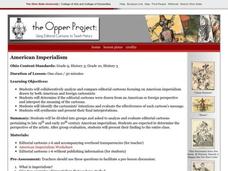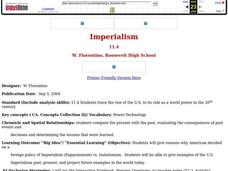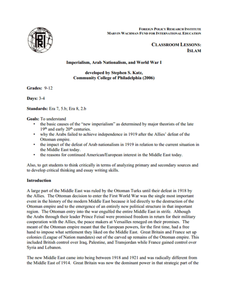Curated OER
American Imperialism
Critical analysis skills can be built in a variety of ways. Using editorial cartoons (both domestic and foreign) learners will consider how American Imperialism was perceived during the late 19th century. Critical thinking questions,...
Curated OER
Creating a Cartoon of the Philippine-American War
During the Industrial and commercial expansion of the United States, war broke out between America and the Philippines. Explore conflict, American Imperialism, and political cartoons with this creative project. Learners view the film,...
National Endowment for the Humanities
The Question of an American Empire
As it rose to being the new super power, America had a choice: conquer other nations like its European predecessors, or stay home. Using primary source documents from those thinking about American foreign policy in the late 1800s,...
US House of Representatives
Hispanic Americans in Congress During the Age of U.S. Colonialism and Global Expansion, 1898–1945
To be Puerto Rican, in the words of one politician, is to be "foreign in a domestic sense." Young historians consider the American role in colonialism and its impacts on Hispanic Americans through the first part of the twentieth century...
National Endowment for the Humanities
The Spanish–American War
The Spanish-American War propelled the United States to the world stage and helped create the modern super power. Using web-based primary sources and a WebQuest format, young scholars consider the causes and outcomes for the war. Working...
Curated OER
Lessons in Looking: Imperialism Cartoons
Using a Smartboard, learners break apart symbolism found in a political cartoon published in 1902. They work to analyze the cartoon in terms of US Imperialism occurring in the late 1890s. All necessary materials are included in this well...
Center for History Education
Breaking the Great League of Peace and Power: The Six Iroquois Nations During and After the American Revolution
What happens when you can't remain neutral? An informative lesson explores the impact of the American Revolution on the Iroquois Nations. Scholars learn about the six Iroquois nations and their treaty with the newly formed American...
US House of Representatives
Exclusion and Empire, 1898–1941
Often forgotten and written off as the model minority, Americans with heritage in Asia and the Pacific Islands have played an essential role in American history, including Congress. Budding historians reclaim history by researching the...
US House of Representatives
From Exclusion to Inclusion, 1941–1992
The legacy of Japanese American internment impacted America for decades, including Congress. Class members consider the tenure of Asian American representatives in Congress and how the legacy of World War II affected their service. Other...
Curated OER
What Was South Carolina's Role in the Spanish American War?
Seventh graders investigate the role of South Carolina in the Spanish American War. In this imperialism lesson, 7th graders analyze primary documents and photographs, in collaborative groups, to determine how the state was involved in...
Curated OER
Imperialism
Students explore the concept of Imperialism. In this foreign policy lesson, students examine the policies of the US and other countries through time. Students then create a political cartoon of their own and create a timeline that...
Curated OER
Imperialism Political Cartoon Assessment
Students work from topics provided by the teacher to create a political cartoon that illustrates imperialism throughout the world, focusing on that which led up to World War One.
City University of New York
African Americans and the Populist Movement
Why did the Populist Party fail to ally itself with African American farmers? To answer this essential question, class members investigate the Populist Era (188-1900) and read an article written by Tom Watson, a Populist leader.
National Endowment for the Humanities
The Matter of the Philippines
The United States won the Spanish-American War, so now what? Young scholars act as advisors to President McKinley and use primary sources to recommend what America should do with its territories. Using a variety of perspectives—including...
Stanford University
Annexation of Hawaii
Once an independent nation, Hawaii became part of the United States only after a business-sponsored coup of its queen. After examining newspapers from the 1890s, learners consider whether native Hawaiians wished to become Americans at...
National Endowment for the Humanities
The New Order for "Greater East Asia"
Sometimes the New Order becomes synonymous with its implications for European countries, but what about its consequences for East Asia? The final instructional activity in a four-part series teaches scholars about World War II. High...
Maryland Department of Education
The Concept of Diversity in World Literature Lesson 1: Unit Introduction
To launch a unit study of the concept of diversity in World Literature, class members compare Chinua Achebe's essay, "An Image of Africa: Racism in Conrad's Heart of Darkness" and Richard Rodriguez's essay, "The Chinese in All of Us: A...
Center for History Education
Who Fired the Shot Heard Round the World?
Take a closer look. Young academics become detectives in an engaging lesson on the American Revolution. Scholars work in groups to analyze documents to uncover whether the American colonists or British soldiers fired the first shot at...
PBS
President Theodore Roosevelt: Foreign Policy Statesman or Bully?
Can a negative perception of a president's foreign policy harm his or her historical legacy? A project that winds the clock back to the date of Theodore Roosevelt's death puts students at the editorial desk of a fictional newspaper....
Foreign Policy Research Institute
Imperialism, Arab Nationalism and World War I
Continued conflict in the Middle East makes this lesson relevant, and the inclusion of a critique of Lawrence of Arabia might increase student interest in a potentially challenging topic. The resource includes a solid introduction to the...
Curated OER
America's Wars, 1898-1945
Students examine the wars the United States was involved in between 1898 and 1945. In groups, they determine the causes and effects of each war and how each war changed the way the United States handled their foreign affairs. As a class,...
Teaching Tolerance
Slavery as a Form of Racialized Social Control
An engaging lesson delves into the effects of slavery on society. Young historians read text excerpts, complete handouts, and participate in group discussion to understand how slavery was a means to control society and establish a racial...
Maryland Department of Education
The Concept of Diversity in World Literature Lesson 12: Author's Purpose - Yeats and Achebe
Is there such a thing as fate/luck? Can one fight destiny? As part of their study of Chinua Achebe's purpose in writing Things Fall Apart, class members answer these questions from Achebe's point of view and then from William Butler...
Stanford University
Philippine-American War Political Cartoon
Students investigate the Philippine War. In this propaganda lesson, students read the a timeline of events during the Philippine War. Students evaluate Philippine propaganda cartoons from the period.
Other popular searches
- American Imperialism Cartoon
- American Imperialism Hawaii
- History American Imperialism
- American Imperialism Spanish
- Latin American Imperialism
- Debate American Imperialism

























